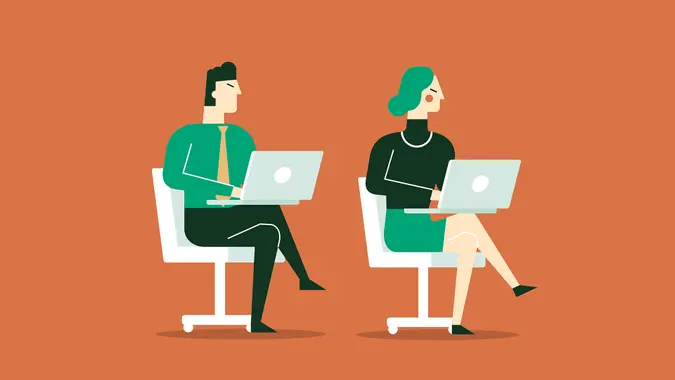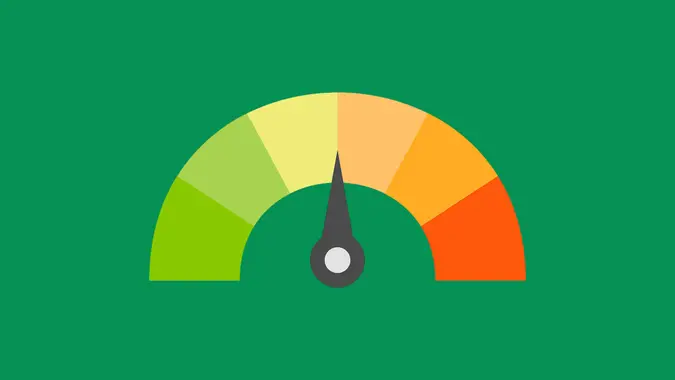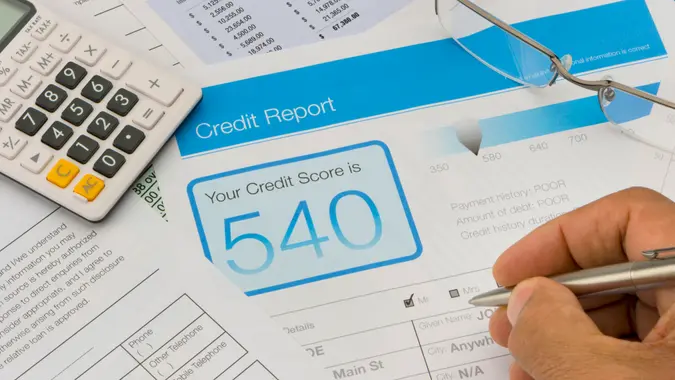What Is Credit Insurance? Benefits, Costs and Alternatives

Commitment to Our Readers
GOBankingRates' editorial team is committed to bringing you unbiased reviews and information. We use data-driven methodologies to evaluate financial products and services - our reviews and ratings are not influenced by advertisers. You can read more about our editorial guidelines and our products and services review methodology.

20 Years
Helping You Live Richer

Reviewed
by Experts

Trusted by
Millions of Readers
Credit insurance is a type of coverage that makes your credit card or loan payments for you if something unexpected happens, such as involuntary unemployment, disability or death.
It’s primarily designed to protect the lender, but in some cases, it can also protect you or your family by keeping the account in good standing if you can’t make your payments.
Credit insurance is typically offered when you take out:
- A loan (like an auto or personal loan)
- A mortgage
- A credit card
While a lender can’t deny your application if you choose not to buy credit insurance, there may be some situations where it’s worth considering. If you opt in, you can always cancel the policy later if you decide it’s no longer necessary.
What Does Credit Insurance Cover?
While coverage varies depending on the policy, credit insurance typically protects events that could affect your ability to repay your debt, including:
- Involuntary unemployment: Most insurance options help you manage job loss (if it’s by no fault of your own) by covering payments for a set number of months.
- Disability: If you get injured and can’t work, credit insurance may help with some or all of your monthly payments while you recover.
- Death: If the borrower passes away, the policy may pay off some or all of the remaining loan balance.
- Illness: In some cases, major health issues that prevent you from working could qualify you for payment assistance under your policy.
Important: Every policy is different, so always check the details in the fine print so you know exactly what coverage you’re getting.
Types of Credit Insurance
Here are the four main types of credit insurance you’ll want to consider:
- Credit life insurance: Credit life insurance is similar to regular life insurance. The insurer pays off the decedent’s remaining loan balance directly to the lender named as the beneficiary. Any money left gets paid to the estate for heirs to inherit.
- Credit disability insurance: This insurance makes payments on your behalf to your lender should you unexpectedly become sick or injured and unable to work. Policies usually come with contract limits on how many payments the insurer will make.
- Credit involuntary unemployment insurance: Involuntary unemployment insurance protects you if you’re involved in a labor dispute, get laid off or lose your job through no fault of your own. The policy will pay all or a portion of your monthly loan payment until you get back to work.
- Credit property insurance: In the event you use personal property as collateral for your loan (like your car or home), credit property insurance may cover it if it’s accidentally destroyed or lost due to theft or a natural disaster.
| Type of Insurance | What It Covers | How It Pays Out |
|---|---|---|
| Credit life | Death | Pays off remaining loan balance |
| Credit disability | Injury or illness preventing work | Pays monthly loan payments |
| Credit unemployment | Involuntary job loss | Covers payments during unemployment |
| Credit property | Property damage | Pays to repair or replace damaged collateral |
How Does Credit Insurance Work?
You might be able to buy credit insurance through your insurer, bank or credit union. But in most cases, a lender will ask you during the loan approval process if you’d like to purchase a credit insurance policy.
If you choose to opt in, you’ll typically have a choice of how to pay for it:
- Single premium method: You pay a one-time premium upfront
- Monthly outstanding balance method: You pay a monthly fee, which the lender adds to your loan or credit card payments
If a covered event occurs, like job loss or disability, you can submit a claim with the insurance provider. Make sure to include any supporting documentation with your claim, like a termination notice or doctor’s note.
After the insurance company approves your claim, it will cover some or all of your payments, depending on the terms of your policy.
Do You Need Credit Insurance?
Credit insurance is optional — you don’t have to buy it, even if your lender offers it.
If the lender says you need credit insurance to get approved for a loan (aside from private mortgage insurance), you can report it to your state department.
However, it might make sense to get credit insurance if:
- You have no savings or safety net
- You work in a field with unstable employment
- You have health concerns
You may not need credit insurance, though, if:
- You already have life or disability insurance.
- You have savings to cover emergencies.
Tip: Credit insurance can be expensive, so make sure to compare the costs to traditional insurance or consider setting up a personal emergency fund instead.
Pros and Cons of Credit Insurance
So, what is credit insurance really going to do for you? Let’s take a closer look at its benefits and drawbacks:
Pros
- Protection from default: Credit insurance can protect you from falling behind on payments if something unexpected happens and you lose your income.
- Peace of mind: You don’t have to worry about what would happen to your debt if you’re laid off or injured and can’t work — even if you don’t have an emergency fund.
- Easier loan approval: Although lenders can’t require you to purchase credit insurance, buying it could make them more comfortable with approving your loan.
Cons
- Increased loan costs: Credit insurance adds to the overall cost of borrowing money, and you may have to pay interest on it if you roll it into your balance.
- Exclusions apply: There may be situations that credit insurance won’t cover, so be sure to read the fine print carefully.
- Other insurance options available: You might find cheaper policies with better coverage through regular life or disability insurance.
Credit Insurance vs. Regular Insurance
Below is a quick comparison between credit insurance and regular life and disability insurance:
| Feature | Credit Insurance | Regular Life/Disability Insurance |
|---|---|---|
| Covers | Specifically covers loan payments | General living expenses (not just loan payments) |
| Linked to loan? | Yes | No |
| Paid to | The lender | You or your family |
| Required? | No | No |
| Cost | Added to loan or paid upfront | Regular monthly premiums |
The Bottom Line
While credit insurance may not be necessary for everyone, it could be a good idea if you want some extra protection. Before agreeing to the coverage:
- Review your loan paperwork to see if the lender offered or already charged you for credit insurance.
- Compare the costs and coverage of other types of insurance.
- Consider what would happen with your loan if you lost your income for a few months.
Credit insurance can help — but only if it fits your needs and budget.
FAQs About Credit Insurance
Here are some common questions and concerns that may come up while looking into credit insurance:- What is credit insurance, and how does it work?
- Credit insurance may help you make payments toward your loan or credit card if you can't pay due to job loss, disability or death. If a covered event happens and your claim is approved, the insurer will pay your lender on your behalf.
- Is credit insurance required?
- No, credit insurance is optional, but it might make sense if you have concerns about your employment or your health.
- Does credit insurance cover credit cards and loans?
- Yes, many credit insurance policies cover both credit cards and loans. However, the exact coverage depends on the policy, so make sure to read the fine print on your loan paperwork.
- Is credit insurance worth it?
- It depends. Credit insurance could be unnecessary if you have steady employment, an emergency fund or other insurance policies. However, it could be highly beneficial if something unexpected happens and you don't have another safety net.
Editorial Note: This content is not provided by any entity covered in this article. Any opinions, analyses, reviews, ratings or recommendations expressed in this article are those of the author alone and have not been reviewed, approved or otherwise endorsed by any entity named in this article.
Our in-house research team and on-site financial experts work together to create content that’s accurate, impartial, and up to date. We fact-check every single statistic, quote and fact using trusted primary resources to make sure the information we provide is correct. You can learn more about GOBankingRates’ processes and standards in our editorial policy.
- Washington State Office of the Insurance Commissioner "Credit Insurance -- Do You Really Need It?"
- CFPB "What is credit insurance for an auto loan?"
- Office of the Comptroller of the Currency "Can I cancel the credit protection on my bank loan?"
- Office of the Comptroller of the Currency "What is credit disability insurance?"
- Washington State Office of the Insurance Commissioner "Credit insurance - do you really need it?"
- AON "Benefits of credit insurance"
 Written by
Written by  Edited by
Edited by 






















